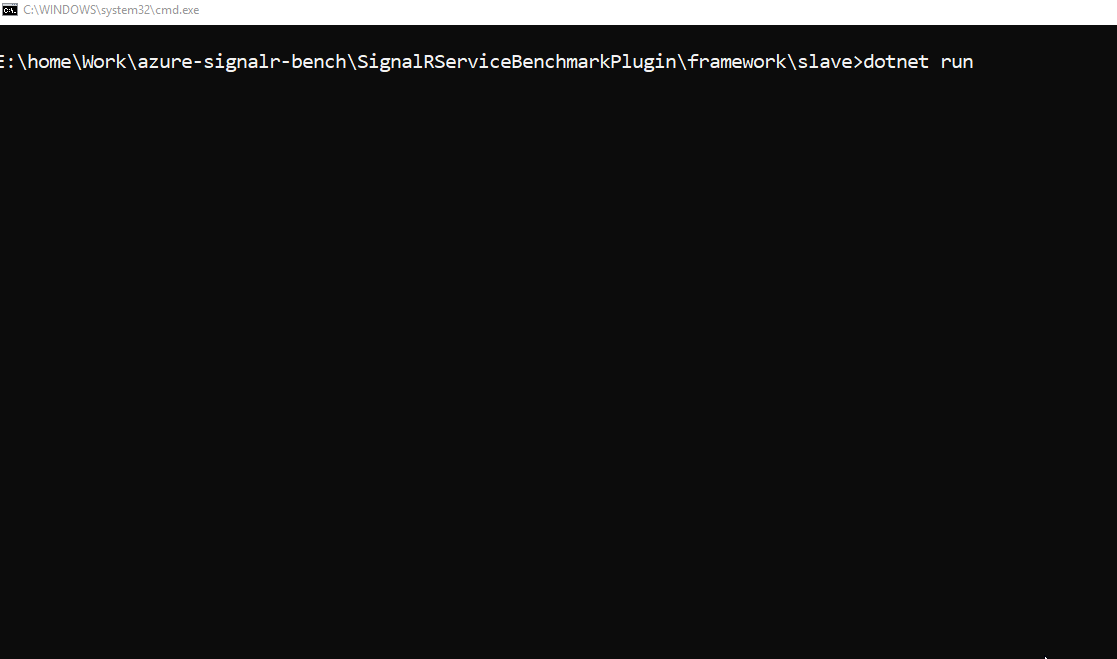Benchmark for Microsoft SignalR and Azure SignalR Service
This benchmark defines some typical performance scenarios, develops an Application Server with Azure SignalR SDK, and builds clients through SignalR client SDK to evaluate the performance of those scenarios.
This benchmark targets to help you evaluate the throughput and latency. It can be used for benchmarking ASP.NET Core SignalR, ASP.NET SignalR and Azure SignalR Service.
Content
-
Scripts: All scripts related to run the benchmark in a large scale, for example, 50 client VMs and 20 app server VMs. If you plan to setup a large scale performance test on Azure, those scripts are for your reference.
-
SignalRServiceBenchmarkPlugin: The benchmark source code folder which can be run on a single machine with 2 commands. If you want to get a quick start, or check the benchmark source code for further development, please go to this folder.
Quick start
 Take 1000 connections for
Take 1000 connections for Echo performance test as an example.
Build
Build the tool through build.bat or build.sh script.
Run
Go to slave folder
dotnet run
Go to master folder
dotnet run -- --BenchmarkConfiguration echo.yaml
Configuration file "echo.yaml" is very simple. There are two required values: mode and webAppTarget. mode is always simple. webAppTarget is the SignalR Hub URL. Default scenario is "echo" even though you did not specify it.
mode: simple
config:
webAppTarget: http://localhost:5050/signalrbenchIf you have a Azure SignalR Service connection string, but does not want to setup the app server, you can specify connection string instead. The benchmark will launch an internal app server for you. It is recommended for serious performance test.
If you want to setup your own app server for this benchmark, please use built-in app server as a reference because the benchmark tool requires a predefined Hub.
Use internal app server, please specify connectionString instead.
mode: simple
config:
connectionString: Endpoint=https://xxx;AccessKey=xxxThe output is like:
-----------
1000 connections established in 8s
-----------
Connections/sendingStep: 1000/500 in 246s
Messages: requests: 244.88MB, responses: 244.88MB
Requests/sec: 484.17
Responses/sec: 484.17
Write throughput: 995.46KB
Read throughput: 995.46KB
Latency:
50%: < 100 ms
90%: < 100 ms
95%: < 100 ms
99%: < 100 ms
-----------
Connections/sendingStep: 1000/1000 in 245s
Messages: requests: 489.71MB, responses: 489.71MB
Requests/sec: 972.18
Responses/sec: 972.18
Write throughput: 2.00MB
Read throughput: 2.00MB
Latency:
50%: < 100 ms
90%: < 100 ms
95%: < 100 ms
99%: < 100 ms
More options
You can see more options by running the following command in master folder
dotnet run -- --BenchmarkConfiguration ?
The benchmark supports many scenarios including echo, broadcast, send to connections, and send to groups. Those scenarios apply on both SignalR and Azure SignalR Service. In addition, it supports Azure SignalR specific scenarios, for example, scenarios on serverless mode: send to user, send to group, and broadcast through REST API.
Typical scenarios
The following configuration examples are for both SignalR and Azure SignalR Service. Before running those test, please start the app server and replace the webAppTarget with your Hub URL.
- broadcast: broadcast a message to 100 clients every second
mode: simple
config:
webAppTarget: http://localhost:5050/signalrbench
connections: 100
baseSending: 1
step: 1
sendingSteps: 1
scenario:
name: broadcast- send to connections: send messages to 1000 clients
mode: simple
config:
webAppTarget: http://localhost:5050/signalrbench
scenario:
name: sendToClient- send to groups: create 500 groups for 1000 connections, which means every group has 2 connections. The benchmark sends message to every group.
mode: simple
config:
webAppTarget: http://localhost:5050/signalrbench
connections: 1000
baseSending: 500
scenario:
name: sendToGroup
parameters:
groupCount: 500Azure SignalR Service specific scenarios.
Please replace the connectionString with your own one.
- restBroadcast
mode: simple
config:
connectionString: Endpoint=https://xxx;AccessKey=xxx
connections: 100
baseSending: 1
step: 1
sendingSteps: 1
scenario:
name: restBroadcast- restSendToUser
mode: simple
config:
connectionString: Endpoint=https://xxx;AccessKey=xxx
scenario:
name: restSendToUser- restSendToGroup
mode: simple
config:
connectionString: Endpoint=https://xxx;AccessKey=xxx
connections: 1000
baseSending: 500
scenario:
name: restSendToGroup
parameters:
groupCount: 500Default settings
Default connection transport type is Websockets, protocol is json, message size is 2048. Feel free to change those if you want to test more configurations.
Contributing
This project welcomes contributions and suggestions. Most contributions require you to agree to a Contributor License Agreement (CLA) declaring that you have the right to, and actually do, grant us the rights to use your contribution. For details, visit https://cla.microsoft.com.
When you submit a pull request, a CLA-bot will automatically determine whether you need to provide a CLA and decorate the PR appropriately (e.g., label, comment). Simply follow the instructions provided by the bot. You will only need to do this once across all repos using our CLA.
This project has adopted the Microsoft Open Source Code of Conduct. For more information see the Code of Conduct FAQ or contact opencode@microsoft.com with any additional questions or comments.